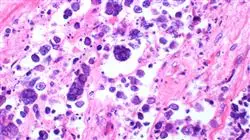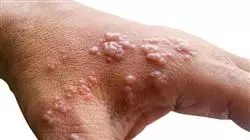University certificate
The world's largest faculty of medicine”
Introduction to the Program
Don't miss this opportunity to catch up on advances in the treatment of infections caused by viruses to incorporate them into your daily medical practice"

The transmission of the different types of viruses can take place through different causes: from physical contact, mosquito bites or sexual intercourse, for example. Therefore, it is necessary to take precautions to avoid any contagion. Even so, viruses affect practically the entire population, so it is necessary to take measures for both prevention and treatment of the diseases that may originate and which are especially virulent in countries with fewer university resources.
Among the viruses that most affect humans are respiratory viruses, varicella zoster, hepatitis, herpes and the HIV virus.
In order to control or eradicate the effects of the different viruses, it is necessary to know the main Advances in Antivirals. Therefore, after completing this Postgraduate certificate, the student will have advanced knowledge in the field that will help him/her to treat his/her patients.
In this way, the training program focuses on the main treatments for the viruses that are currently most widespread throughout the world. The official statistics show the need for further research in this area. Thus, according to the World Health Organization (WHO), only in the case of sexually transmitted infections, one million people are infected every day worldwide; while it is estimated that more than 500 million people are carriers of the virus that causes genital herpes type 2.
These data invite medical professionals to continue increasing their knowledge through training courses such as this one, which are given by leading professionals in the field and who contribute their knowledge to continue improving the quality of healthcare.
A unique, key, and decisive training experience to boost your professional development”
This Postgraduate certificate in Advances in Antivirals contains the most complete and up-to-date scientific program on the market. The most outstanding features of the University Course are:
- The development of more than 75 case studies presented by experts in Advances in Antivirals. The graphic, schematic, and eminently practical contents with which they are created provide scientific and practical information on the disciplines that are essential for professional practice
- The latest news on Advances in Antivirals
- The content of practical exercises where the self-evaluation process can be carried out to improve learning
- Special emphasis is placed on innovative methodologies inAdvances in Antivirals
- Theoretical lessons, questions to the expert, debate forums on controversial topics, and individual reflection assignments
- Content that is accessible from any fixed or portable device with an Internet connection
Train with the most updated methodology and content on the market and increase your capabilities to excel in the development of your profession"
Its teaching staff includes professionals belonging to the field of antivirals, who bring to this training the experience of their work, in addition to recognized specialists belonging to reference societies and prestigious universities. The multimedia content developed with the latest educational technology will provide the professional with situated and contextual learning, i.e., a simulated environment that will provide immersive training program to train in real situations. The design of this program is based on problem-based learning, by means of which the professional must try to solve the different professional practice situations that arise throughout the course. For this purpose, the professional will be assisted by an innovative interactive video system developed by recognized experts in the field of Antivirals Advances and with great experience.
Increase your visibility, excellence and professional development by updating your knowledge through this Postgraduate certificate

The multimedia content developed with the latest educational technology will allow the professional a situated and contextual learning, that is, a simulated environment that will provide an immersive learning programmed to train in real situations"
Why study at TECH?
TECH is the world’s largest online university. With an impressive catalog of more than 14,000 university programs available in 11 languages, it is positioned as a leader in employability, with a 99% job placement rate. In addition, it relies on an enormous faculty of more than 6,000 professors of the highest international renown.

Study at the world's largest online university and guarantee your professional success. The future starts at TECH”
The world’s best online university according to FORBES
The prestigious Forbes magazine, specialized in business and finance, has highlighted TECH as “the world's best online university” This is what they have recently stated in an article in their digital edition in which they echo the success story of this institution, “thanks to the academic offer it provides, the selection of its teaching staff, and an innovative learning method aimed at educating the professionals of the future”
A revolutionary study method, a cutting-edge faculty and a practical focus: the key to TECH's success.
The most complete study plans on the university scene
TECH offers the most complete study plans on the university scene, with syllabuses that cover fundamental concepts and, at the same time, the main scientific advances in their specific scientific areas. In addition, these programs are continuously being updated to guarantee students the academic vanguard and the most in-demand professional skills. In this way, the university's qualifications provide its graduates with a significant advantage to propel their careers to success.
TECH offers the most comprehensive and intensive study plans on the current university scene.
A world-class teaching staff
TECH's teaching staff is made up of more than 6,000 professors with the highest international recognition. Professors, researchers and top executives of multinational companies, including Isaiah Covington, performance coach of the Boston Celtics; Magda Romanska, principal investigator at Harvard MetaLAB; Ignacio Wistumba, chairman of the department of translational molecular pathology at MD Anderson Cancer Center; and D.W. Pine, creative director of TIME magazine, among others.
Internationally renowned experts, specialized in different branches of Health, Technology, Communication and Business, form part of the TECH faculty.
A unique learning method
TECH is the first university to use Relearning in all its programs. It is the best online learning methodology, accredited with international teaching quality certifications, provided by prestigious educational agencies. In addition, this disruptive educational model is complemented with the “Case Method”, thereby setting up a unique online teaching strategy. Innovative teaching resources are also implemented, including detailed videos, infographics and interactive summaries.
TECH combines Relearning and the Case Method in all its university programs to guarantee excellent theoretical and practical learning, studying whenever and wherever you want.
The world's largest online university
TECH is the world’s largest online university. We are the largest educational institution, with the best and widest online educational catalog, one hundred percent online and covering the vast majority of areas of knowledge. We offer a large selection of our own degrees and accredited online undergraduate and postgraduate degrees. In total, more than 14,000 university degrees, in eleven different languages, make us the largest educational largest in the world.
TECH has the world's most extensive catalog of academic and official programs, available in more than 11 languages.
Google Premier Partner
The American technology giant has awarded TECH the Google Google Premier Partner badge. This award, which is only available to 3% of the world's companies, highlights the efficient, flexible and tailored experience that this university provides to students. The recognition as a Google Premier Partner not only accredits the maximum rigor, performance and investment in TECH's digital infrastructures, but also places this university as one of the world's leading technology companies.
Google has positioned TECH in the top 3% of the world's most important technology companies by awarding it its Google Premier Partner badge.
The official online university of the NBA
TECH is the official online university of the NBA. Thanks to our agreement with the biggest league in basketball, we offer our students exclusive university programs, as well as a wide variety of educational resources focused on the business of the league and other areas of the sports industry. Each program is made up of a uniquely designed syllabus and features exceptional guest hosts: professionals with a distinguished sports background who will offer their expertise on the most relevant topics.
TECH has been selected by the NBA, the world's top basketball league, as its official online university.
The top-rated university by its students
Students have positioned TECH as the world's top-rated university on the main review websites, with a highest rating of 4.9 out of 5, obtained from more than 1,000 reviews. These results consolidate TECH as the benchmark university institution at an international level, reflecting the excellence and positive impact of its educational model.” reflecting the excellence and positive impact of its educational model.”
TECH is the world’s top-rated university by its students.
Leaders in employability
TECH has managed to become the leading university in employability. 99% of its students obtain jobs in the academic field they have studied, within one year of completing any of the university's programs. A similar number achieve immediate career enhancement. All this thanks to a study methodology that bases its effectiveness on the acquisition of practical skills, which are absolutely necessary for professional development.
99% of TECH graduates find a job within a year of completing their studies.
Postgraduate Certificate in Advances in Antivirals
Among the viruses that most affect humans are respiratory viruses, varicella-Zoster, Hepatitis, Herpes or HIV. Not surprisingly, there are several ways in which different types of viruses can be transmitted, either by physical contact, mosquito bites or sexual intercourse, among others. And with this Postgraduate Certificate in Advances in Antivirals you will be able to update you in the current lines of research for the development of effective antivirals.
Get up to date in the development of effective antivirals
The Postgraduate Certificate in Advances in Antivirals focuses on the main treatments for the most common viruses worldwide, as statistics show the need for further research in this field. To do so, you will examine antivirals for respiratory infections, Hepatitis, Herpes, HIV and other serious pathologies. All this will be at your fingertips in only 125 hours of academic coursework in which you will benefit from the most updated and comprehensive vision of this subject. In this line, only with a device with Internet connection you will have access to an extensive digital library of resources on Advances in Antivirals.







